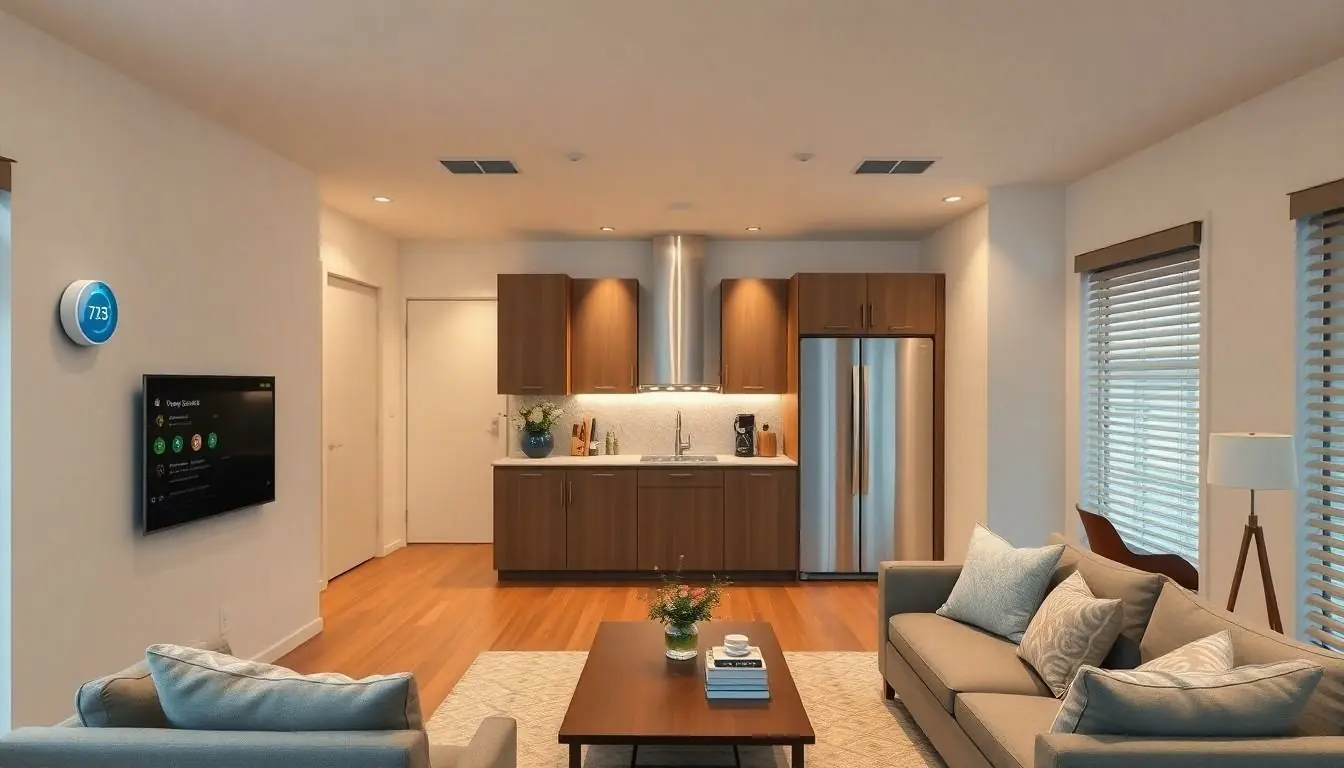Imagine walking into your home and having it greet you like a loyal dog—lights flick on, the thermostat adjusts, and your favorite playlist starts playing. Welcome to the world of smart home realty, where homes are no longer just structures but intelligent spaces that cater to every whim. As technology evolves, so does the way people buy and sell homes, making smart features a hot commodity in the real estate market.
In this digital age, buyers aren’t just looking for four walls and a roof. They want a home that can think for itself, from security systems that alert you faster than a gossiping neighbor to kitchen gadgets that might just make you a better chef (or at least help you pretend). Dive into the fascinating realm of smart home realty, where convenience meets innovation, and discover why these tech-savvy homes are the future of living.
Table of Contents
ToggleOverview Of Smart Home Realty
Smart home realty integrates technology into residential spaces, creating intelligent environments. Enhanced living experiences become possible through features like automated lighting, smart thermostats, and advanced security systems. Buyers increasingly prioritize these conveniences, reflecting a significant shift in market demand.
The prevalence of smart features in homes supports energy efficiency and security, reducing utility costs and increasing safety. Current statistics show that 69% of homebuyers express a strong preference for residences equipped with smart technology. As innovation continues, industry experts predict that smart home devices will dominate the real estate landscape.
Modern infrastructures support the installation of smart technology, allowing seamless integration into existing properties. Various companies focus on developing compatible solutions that cater to diverse homeowner needs. Customization options enable residents to personalize their experiences, increasing user satisfaction.
Investors recognize the long-term value of smart homes, anticipating higher resale values due to energy efficiency and appealing features. A survey indicated that homes with smart technology command a price premium, making them attractive assets. As a result, realtors emphasize smart features during property listings, significantly impacting buyer decisions.
Smart home realty shapes today’s market trends, reflecting consumers’ desires for technological advancements. Quality of life improves as homes evolve into interconnected networks, enhancing comfort and convenience. This transformation signifies an exciting direction for future real estate development.
Benefits Of Smart Home Realty

Smart home realty offers numerous advantages that significantly improve the overall living experience. With innovative technology, homeowners enjoy both comfort and efficiency.
Increased Energy Efficiency
Smart home technology optimizes energy usage by allowing homeowners to control devices remotely. Automated lighting adjusts based on occupancy, minimizing waste. Programmable thermostats ensure heating and cooling operate only when necessary, leading to cost savings. Homes equipped with energy-efficient appliances reduce electricity consumption, impacting utility bills positively. According to recent studies, smart homes can save up to 30% on energy costs. Many buyers prioritize these energy-efficient features, enhancing market value and appeal.
Enhanced Security Features
Security systems in smart homes utilize advanced technology to provide comprehensive protection. Homeowners can monitor their properties via smartphone apps, receiving real-time alerts about potential threats. Integrated cameras, motion detectors, and smart locks ensure robust security measures are always in place. Automation features, such as scheduled lighting, create the illusion of occupancy, deterring intruders. Current trends indicate that 69% of homebuyers seek smart security solutions, underscoring the importance of safety in modern living environments. Enhanced security features not only safeguard families but also elevate property desirability.
Challenges In Smart Home Realty
Smart home realty faces several challenges that impact its growth and adoption. Understanding these obstacles is essential for stakeholders in the real estate market.
Technological Limitations
Technological limitations hinder the complete integration of smart home features. Compatibility issues arise as different devices may not work seamlessly together. For instance, certain smart lighting systems may not connect with specific security cameras. Performance inconsistencies can also occur, causing user frustration and reluctance to invest in smart technology. These limitations compromise the overall user experience, making homeowners hesitant to adopt these advancements fully.
Privacy Concerns
Privacy concerns significantly impact consumer confidence in smart home technology. Data breaches pose risks, leading many potential buyers to hesitate. Smart devices often collect personal information, raising questions about data security. Users worry about unauthorized access to their home networks as well. With 69% of homebuyers prioritizing security solutions, addressing these concerns is crucial for fostering trust in the smart home market. Ensuring robust privacy protections is vital for enhancing user adoption rates and solidifying smart home realty’s future.
Trends Shaping Smart Home Realty
Smart home realty is evolving rapidly, with significant trends that drive innovation and consumer interest.
Integration With Artificial Intelligence
Integration with artificial intelligence (AI) transforms how residents interact with their homes. Systems equipped with AI can learn user preferences, optimizing comfort and convenience. Homes equipped with voice-controlled assistants respond effectively to commands, enabling effortless management of devices. Buyers prioritize homes that offer personalized experiences created by AI, ensuring ease of use. Current statistics reveal that 69% of homebuyers value smart technology, showcasing the growing desire for intelligent automation. Homes utilizing AI also enhance security by analyzing patterns and detecting anomalies. Advanced algorithms facilitate proactive alerts about unusual activities, increasing peace of mind for homeowners.
Demand For Sustainable Living Solutions
Demand for sustainable living solutions significantly shapes smart home realty. More buyers seek homes that minimize environmental impact while promoting energy efficiency. Integrating smart systems allows homeowners to monitor and reduce energy consumption. Real-time data on energy usage helps optimize habits, potentially saving up to 30% on costs. Innovative features such as solar panels and smart thermostats appeal to environmentally conscious buyers. Many individuals prioritize sustainable homes due to rising awareness of climate change and resource conservation. As 69% of homebuyers express preference for smart technology, builders respond by incorporating eco-friendly solutions in new developments. Sustainable living solutions not only address consumer demands but also contribute positively to the environment.
Smart home realty represents a transformative shift in the housing market. As technology continues to evolve homeowners are embracing the convenience and security that smart features provide. With a significant portion of buyers prioritizing these innovations the demand for smart homes is only set to grow.
While challenges like compatibility and privacy concerns exist addressing these issues will be essential for broader adoption. The integration of AI and sustainable solutions further highlights the potential of smart homes to enhance quality of life and reduce environmental impact. As the market adapts to these trends smart home realty is poised to redefine modern living.



